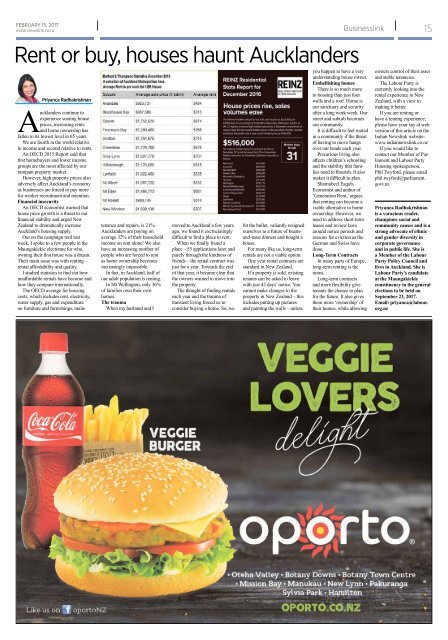Create successful ePaper yourself
Turn your PDF publications into a flip-book with our unique Google optimized e-Paper software.
FEBRUARY <strong>15</strong>, <strong>2017</strong><br />
Businesslink<br />
<strong>15</strong><br />
Rent or buy, houses haunt Aucklanders<br />
Priyanca Radhakrishnan<br />
Aucklanders continue to<br />
experience soaring house<br />
prices, increasing rents<br />
and home ownership has<br />
fallen to its lowest level in 65 years.<br />
We are fourth in the world relative<br />
to income and second relative to rents.<br />
An OECD 20<strong>15</strong> Report said that<br />
first homebuyers and lower income<br />
groups are the most affected by our<br />
rampant property market.<br />
However, high property prices also<br />
adversely affect Auckland’s economy<br />
as businesses are forced to pay more<br />
for worker recruitment and retention.<br />
Financial insecurity<br />
An OECD economist warned that<br />
house price growth is a threat to our<br />
financial stability and urged New<br />
Zealand to dramatically increase<br />
Auckland’s housing supply.<br />
Out on the campaign trail last<br />
week, I spoke to a few people in the<br />
Maungakiekie electorate for who,<br />
owning their first house was a dream.<br />
Their main issue was with renting –<br />
rental affordability and quality.<br />
I studied statistics to find out how<br />
unaffordable rentals have become and<br />
how they compare internationally.<br />
The OECD average for housing<br />
costs, which includes rent, electricity,<br />
water supply, gas and expenditure<br />
on furniture and furnishings, main-<br />
tenance and repairs, is 21%.<br />
Aucklanders are paying on<br />
average 32% of their household<br />
income on rent alone! We also<br />
have an increasing number of<br />
people who are forced to rent<br />
as home ownership becomes<br />
increasingly impossible.<br />
In fact, in Auckland, half of<br />
our adult population is renting.<br />
In Mt Wellington, only 36%<br />
of families own their own<br />
homes.<br />
The trauma<br />
When my husband and I<br />
moved to Auckland a few years<br />
ago, we found it excruciatingly<br />
difficult to find a place to rent.<br />
When we finally found a<br />
place – 55 applications later and<br />
purely through the kindness of<br />
friends – the rental contract was<br />
just for a year. Towards the end<br />
of that year, it became clear that<br />
the owners wanted to move into<br />
the property.<br />
The thought of finding rentals<br />
each year and the trauma of<br />
transient living forced us to<br />
consider buying a home. So, we<br />
bit the bullet, valiantly resigned<br />
ourselves to a future of beansand-toast<br />
dinners and bought a<br />
house.<br />
For many like us, long-term<br />
rentals are not a viable option.<br />
One year rental contracts are<br />
standard in New Zealand.<br />
If a property is sold, existing<br />
tenants can be asked to leave<br />
with just 42 days’ notice. You<br />
cannot make changes to the<br />
property in New Zealand – this<br />
includes putting up pictures<br />
and painting the walls – unless<br />
you happen to have a very<br />
understanding house owner.<br />
Embellishing homes<br />
There is so much more<br />
to housing than just four<br />
walls and a roof. Home is<br />
our sanctuary and security<br />
after a long work week. Our<br />
street and suburb becomes<br />
our community.<br />
It is difficult to feel rooted<br />
in a community if the threat<br />
of having to move hangs<br />
over our heads each year.<br />
Precarious living also<br />
affects children’s schooling<br />
and the stability that families<br />
need to flourish. It also<br />
makes it difficult to plan.<br />
Shamubeel Eaqub,<br />
Economist and author of<br />
‘Generation Rent,’ argues<br />
that renting can become a<br />
viable alternative to home<br />
ownership. However, we<br />
need to address short-term<br />
leases and review laws<br />
around notice periods and<br />
reasons for eviction as the<br />
German and Swiss have<br />
done.<br />
Long-Term Contracts<br />
In many parts of Europe,<br />
long-term renting is the<br />
norm.<br />
Long-term contracts<br />
and more flexibility give<br />
tenants the chance to plan<br />
for the future. It also gives<br />
them more ‘ownership’ of<br />
their homes, while allowing<br />
owners control of their asset<br />
and stable tenancies.<br />
The Labour Party is<br />
currently looking into the<br />
rental experience in New<br />
Zealand, with a view to<br />
making it better.<br />
If you are renting or<br />
have a renting experience,<br />
please have your say at web<br />
version of this article on the<br />
Indian Newslink websitewww.indiannewslink.co.nz<br />
If you would like to<br />
contact our Member of Parliament<br />
and Labour Party<br />
Housing spokesperson,<br />
Phil Twyford, please email<br />
phil.twyford@parliament.<br />
govt.nz<br />
Priyanca Radhakrishnan<br />
is a voracious reader,<br />
champions social and<br />
community causes and is a<br />
strong advocate of ethnic<br />
and gender diversity in<br />
corporate governance<br />
and in public life. She is<br />
a Member of the Labour<br />
Party Policy Council and<br />
lives in Auckland. She is<br />
Labour Party’s candidate<br />
at the Maungakiekie<br />
constituency in the general<br />
elections to be held on<br />
September 23, <strong>2017</strong>.<br />
Email: priyanca@labour.<br />
org.nz


















